Graduate, Write a Black List Featured Script, & Reveal Mr. Christmas to the World
With a Vimeo Staff Pick under its belt in this the month of making merry, Nick Palmer's documentary about the charmingly idiosyncratic Bruce Mertz, better known in Concord, California as Mr. Christmas, looks set to rack up views in numbers equal to its subject’s annual display of synchronized festive lights. A working Hollywood screenwriter who, with writing partner Jeremiah Friedman, has penned and sold scripts to studios and has the coveted distinction of being included on the much-lauded Black List, Palmer joins No Film School to discuss his writing career and how he brought the story of Mr. Christmas to screen. Prepared to be dazzled after the jump.
NFS: You and your writing partner Jeremiah Friedman sold the spec script Family Getaway to Warner Brothers and also gained a much coveted place on 2010’s Black List. How did that come about?
Nick Palmer: Jeremiah and I met in the directing program at AFI, and started writing together after we graduated in 2008. He had an idea for a sports comedy that I found funny, and we decided to write it together. There was this nice little three or four-month period, where we were basically done with school, but still collecting student loans, so we wrote this script. Nothing really happened with it, but it was clear we worked well as a team, so we decided to write another script, which became Family Getaway.
Of course, the student loans had run out by now, and we had to get day jobs. He was doing data entry at a hospital in the Minimally Invasive Urology Department. Miserable work. Meanwhile, I was having the time of my life teaching an after school Lego Robotics class, which basically just involved building robots out of Legos with nerdy 4th graders. It was an awesome job, but we both knew if we were going to get anywhere professionally, it was on us. So we would just get together 4 nights a week, and 1 full day each weekend and wrote Family Getaway. It destroyed my social life for at least a year, but at the end of that we had a script we were proud of, and through a friend we got managers at Mosaic.
Once we had managers, we worked with them and a producer at the company for about 6 months, tightening the script and really learning what it needed (and didn’t need) to be a movie. It was incredibly educational, and our first experience developing a script in Hollywood. For instance, our story is about a spy who’s forced to take his dysfunctional family on the road with him after he’s attacked by assassins on Thanksgiving weekend. In our original version, the spy’s cover was that he’s a schluby loser -- the kind of guy no one would ever expect to be a highly skilled spy. It was a fun idea, and made him more of a black sheep in the family.
But at our first meeting with the producer, he’s like “There’s maybe 2 guys in Hollywood who can play this character and open an $80 million action/comedy. You need to broaden the role.” We really fought against it, but ultimately realized he was right. There’s a ton of factors that a studio considers before they buy a script, and one of the biggest is who will they cast. Only way an $80 million action/comedy gets made is if there’s a big star in it. While the schluby guy may have made for a better script, it was probably never going to make a movie.
So, after a good year and a half with this script, everything built to this single day, where our managers sent the script out to the studios in the morning, and by the end of the day we’d know whether anyone would buy it or not. Pretty terrifying. And what’s worse, I was doing inventory with these Lego kits at work that week. So I’m sitting in this dimly-lit room, counting thousands of Lego pieces, and just staring at my cellphone. It was torture. Every hour or so we’d get an update with a couple more places passing. But by the end of the day, Warner Brothers bought it, and I’m getting a call from the Hollywood Reporter. It was all very surreal.
Total unknowns selling a script to Warner Brothers certainly got some attention, so we were read pretty widely, which is how we ultimately ended up in a good place on the Black List.
NFS: Did inclusion on the Black List immediately open up doors for you guys as writers for hire? How much did it change your career?
NP: It opened doors for sure, but I’d say the Warner Brothers sale was the major change. No one had ever heard of us before that, so after the sale, we spent a couple of months just taking meetings with studios and production companies. Maybe 3 or 4 a day. It was all very strange, because Jeremiah and I had never been the guys people were clamoring to work with at AFI. It was like suddenly being the hot girls everyone in high school wants to sleep with. We did that for a couple of months, then the Black List came out and it was another round of meetings.
I think it’s incredibly cool what Franklin has done with the Black List. The number of great scripts that actually make it to the big screen is pretty low, and still lower is the number of great scripts that end up becoming great movies. I love that the Black List brings so much attention to the work that screenwriters do.
NFS: As studios become less inclined to produce films which aren’t remakes or comic book franchises, it’s gotten much harder for writers to get pitches or even detailed treatments picked up. Is that something you’ve noticed in your own career?
NP: Because we’ve only been working professionally for a little over 3 years, we’ve actually never known anything different. In a strange way, I feel really fortunate for that. I know guys who’ve been writing for a decade, and felt the squeeze as fewer and fewer jobs became available, and as studios became a lot more hesitant to buy original pitches. For us, it’s all we’ve ever known. Typically, you’re competing with a half-dozen writers for every job, and you need to come in with all three acts pretty fleshed out. It’s kind of absurd -- you need to basically write the movie before you get hired to write the movie. But because it’s all we’ve ever known, we just know that’s the deal, and we push ourselves that much harder.
NFS: Along with original pitches you guys are also involved in re-writes. Have you found that there any career advantages to jumping onboard established projects?
NP: Like I mentioned earlier, seeing a project through from pitch to finished film is quite a process, filled with all kinds of obstacles that could derail the whole thing. We’ve been fortunate enough to sell a couple of pitches, but after several projects didn’t go in the direction we would have hoped, we shifted into rewriting projects that already have momentum at studios. We’re in the middle of two at the moment -- one with a director attached, and the other with a star.
While working on your own original idea is a lot of fun, our goal at this stage in our career is to get a movie made, and the person that’s going to make that happen is ultimately a director or a star. Rather than write the version of the movie we'd like to see, then hope we can attract a director or star (who will inevitably take it in a new direction), we cut that stage out completely. Instead, we work with the director or star to build the version of the movie they want to make. They’re the ones who will get the movie made, so it makes way more sense to work with them and build a script we’re all happy with. So far, it’s been a great learning experience for us, and pretty cool to collaborate with people we grew up watching.
NFS: Have documentaries always been a form of filmmaking that’s interested you?
NP: For sure. I remember mentioning Errol Morris and Steve James as two of my favorite filmmakers at my AFI interview, and the interviewers having to clarify, “You know we don’t make documentaries here, right?” The earliest video I made with my friends was a faux-documentary about the Trojan War for my 5th grade class, and I was making little documentaries all throughout high school and college, alongside the narratives I was working on. Mostly goofy things about the school play or my friends’ bands.
NFS: How did you discover Mr. Christmas and his homemade, dazzling seasonal lights? Was it hard to get him onboard for a full on documentary?
NP: I actually grew up down the street from him, so his house and all those lights were a major part of Christmas for me growing up. My family would always drive around the neighborhood and look at lights, saving his place for last because he’d blow everyone else out of the water. I don’t remember ever getting out to look at them, though, and I don’t remember actually meeting him as a kid. He was more like this mythical figure to me.
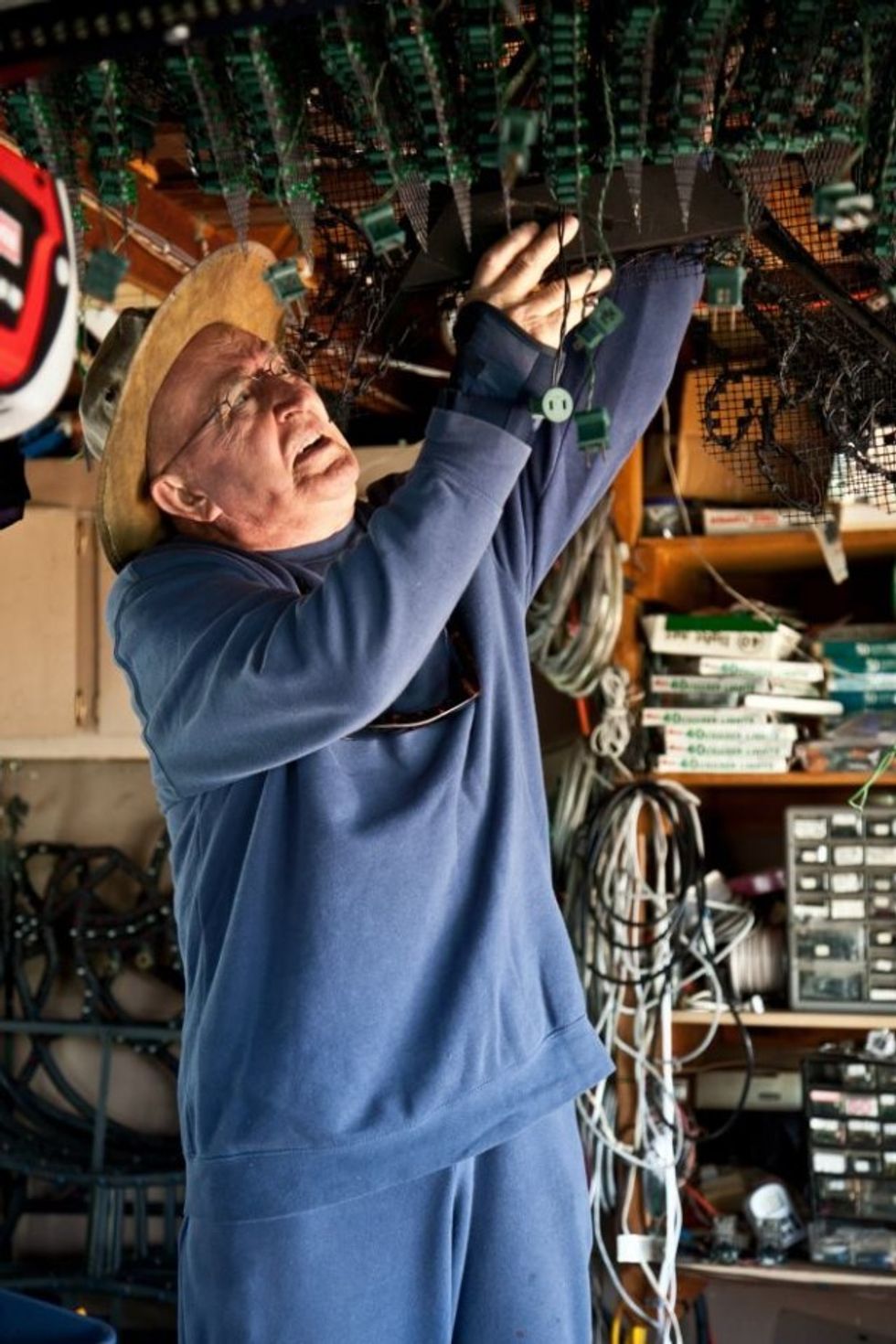
Over the years, there’d been a lot of pieces done on him by the local news, but they usually just involved a reporter coming out one evening and filming for an hour or two. I think he expected something more along those lines, so he was surprised that I ended up shooting with him for almost a year. But I thought it was important to capture his set-up process, which takes 4 months, and his take-down process, which is another 3 months. So every month or so I’d just head up there with my DP, Amanda, and spend the weekend filming with Bruce. I don’t think either of us really knew what we were getting into when we started, but it ended up being a really special experience as we got to know each other better.
NFS: It would have been easy to paint Mr. Christmas as a kooky eccentric, but instead you present a really charming buddy story. At what point did you realise his relationship with Randy was going to be a central component of the film?
NP: That’s really the great thing about documentaries, isn’t it? You head in with one story in mind, and discover something completely different once the camera starts rolling. Our first day of shooting, Bruce called up his buddy Randy to come give him a hand with the lights, and within 5 minutes of these two working together, Amanda and I were like, “This is the movie!” We thought we were telling the story of a man and his Christmas lights, but it turned out to be the story of two friends -- and a cat who does tricks.
NFS: When it came to filming, what gear did you and your cinematographer Amanda Treyz use?
NP: We started shooting with the Panasonic HVX, just because that was the camera I had. That camera was great for all the daytime exteriors of Bruce’s set-up and the daytime interior interviews. However, once the holidays rolled around and we needed to actually shoot the lights at night, we realized the HVX was never going to work. Luckily, a friend of mine who lives near Bruce was insanely generous with his Canon 5D, which is able to capture incredible nighttime shots. The real drag was at that time, the 5D could only shoot at 30 fps. All our HVX footage had been 24 fps. So editing was a huge nightmare.
NFS: How did you handle the transition of moving from building three-act, plot driven Hollywood scripts to having to discover your story amongst the hours of footage you shot on Mr. Christmas?
NP: I was a little lost at first, actually. Jeremiah and I spend so much time breaking stories where the fate of the world is at stake, or at the very least one character’s soul is on the line, that just painting a small portrait of a sweet old guy felt really amorphous to me. I would film with Bruce, secretly hoping that he’d suddenly confess to murdering his neighbor, just so I’d have some big twist to hang the whole thing on.
Since that didn’t happen, the way I ended up approaching it was to make a list of the things I really wanted in the film. It ranged from small moments to larger sequences, images that stuck with me or stray quotes that were particularly funny or memorable. I did all the logging myself, which was a headache (there was over 30 hours of footage), but it allowed me to become really familiar with what I had. Now that I knew the components I wanted to include, I built a kind of emotional outline to the story. There weren’t huge turns in the plot, but there were new sides of Bruce I could reveal.
So I put myself in the head of the viewer. I looked through the sequences I wanted to include, and thought, “What does this make the audience feel?” I started with the Mr. Christmas you’d come in expecting -- a quirky eccentric who takes his Christmas lights really seriously. From there I could start surprising people with the other sides of Bruce. I saved a lot of the stuff about Bruce’s backstory for later in the film, because I wanted it to come when the audience was really curious. They’d been hanging out with Bruce for a while at that point, so my hope was they wanted to know more about his background. When he talks about his wife’s death, it’s more emotional because it comes late in the film, when you’ve gotten to know Bruce.
But I discovered something similar with the scene of Bruce getting drunk, dancing in the street, and hitting on those girls. To me, it was incredibly hilarious and very human. It showed Bruce being like any other guy. But in my first cut, I had the scene a lot earlier in the film, and it turned off a lot of people. They dismissed Bruce as a dirty old man, and had a hard time connecting with the rest of the film. I thought I’d have to cut it completely, but then I realized if I save it for later in the film, the audience has gotten to know Bruce better, so they see it the same way I do. It’s just Bruce having a good time (and being a little bit of a dirty old man, I guess).
NFS: Could you talk about Jim Briggs’ score and how you worked together to hit the right tone for Mr. Christmas?
NP: I knew I wanted the film to have a fun, sweet tone but with a certain amount of sadness just below the surface. Because of that, I found myself pulled towards Pet Sounds by the Beach Boys. It’s one of my favorite records, primarily because that whole album is packed with wonderful, infectious pop songs, but underlying all of them is this deep sadness (probably because Brian Wilson was clinically depressed at the time). Along with that, Bruce plays a CD of bluegrass Christmas music by a band named Banjomania. That thing was running on repeat every night we shot, so I knew we needed some banjos on the soundtrack too.
So I gave Jim a bunch of instrumentals off Pet Sounds, Banjomania, and a handful of Sufjan Stevens Christmas tunes, and that was our starting point. I've been working with Jim for over a decade, so we have a pretty good shorthand at this point (it mostly involves me demanding more kettle drums and making everything sound like Phil Spector produced it). The process really became a balancing act -- keeping the music from becoming too cute or too somber, but also keeping it feeling Christmassy without becoming kitsch. Once you bust out the sleigh bells, you really need to tread lightly.
NFS: Did Bruce enjoy being in the documentary spotlight? How did he react to the finished film?
NP: I was really nervous showing it to him, actually. I feel I painted a pretty affectionate portrait, but you just don’t know how someone is going to react to your version of them. Because we’d become friends at that point, I was terrified he’d be upset about some of the less-flattering moments, but he never asked me to change anything. He’s a big fan.
NFS: What new projects should we be looking out for from you?
NP: Professionally, we’re in the middle of a rewrite, and developing a television pitch for the new year. Meanwhile, I’ve also been playing around with another documentary about a friend of mine who is a children’s musician and makes a living as the entertainment in a convalescent home. We’ll see if anything happens with that.
***
Thanks very much to Nick for talking to us.
So did you find yourself charmed by Nick's portrayal of Mr. Christmas? Let us know if you've had similar screenwriting experiences to Nick and Jeremiah during your careers.
Link: Mr. Christmas Movie
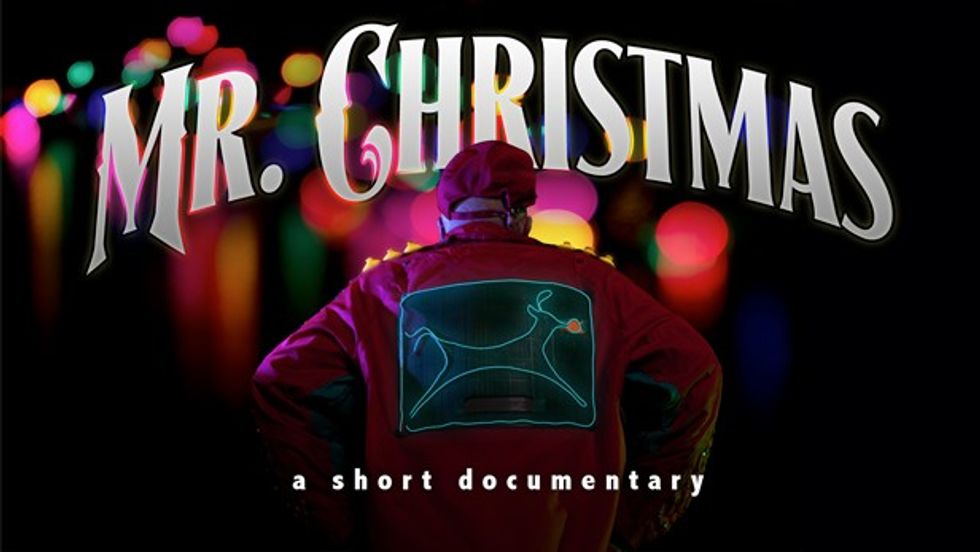
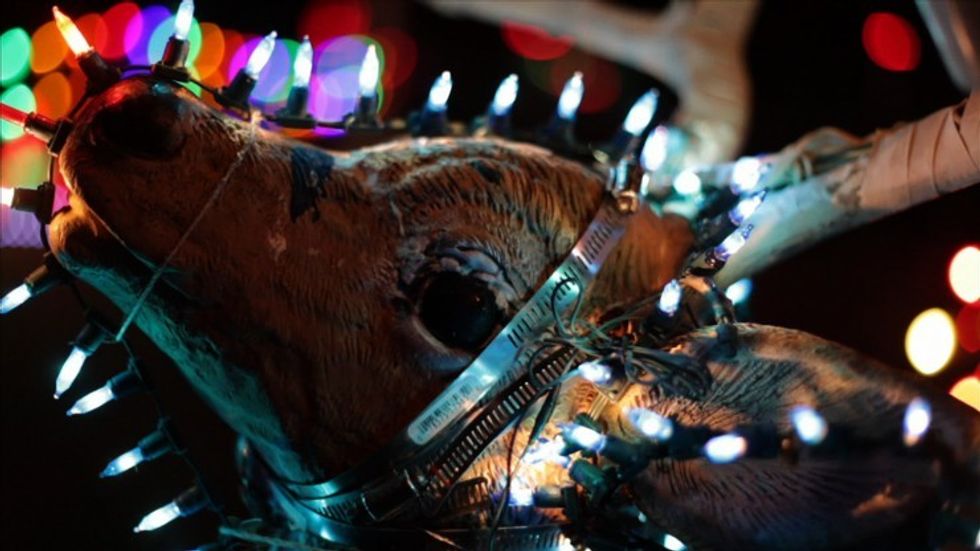
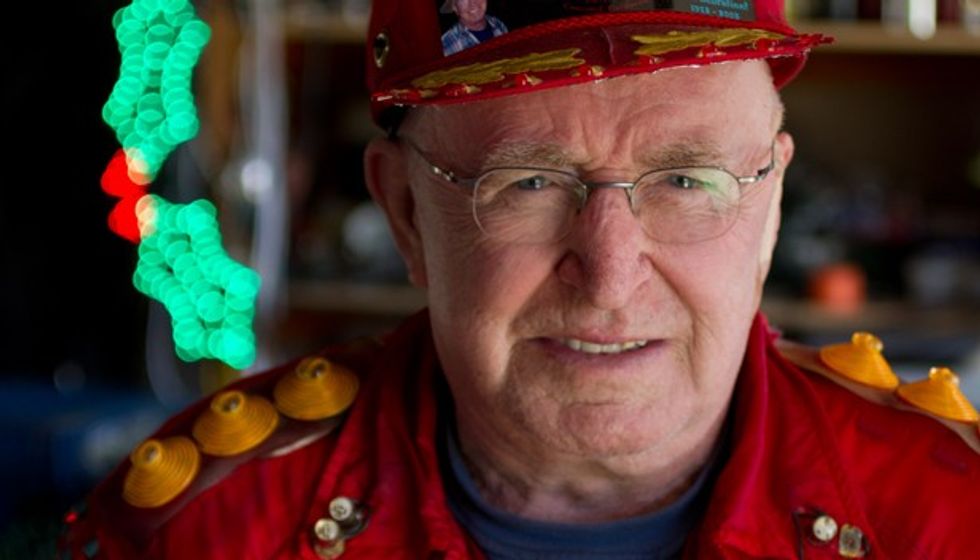
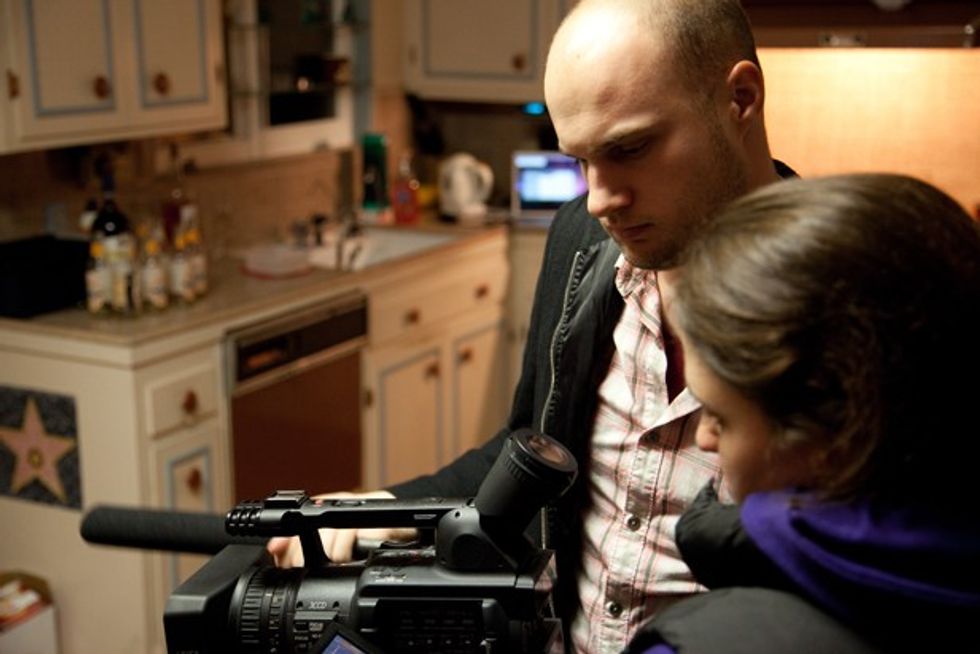

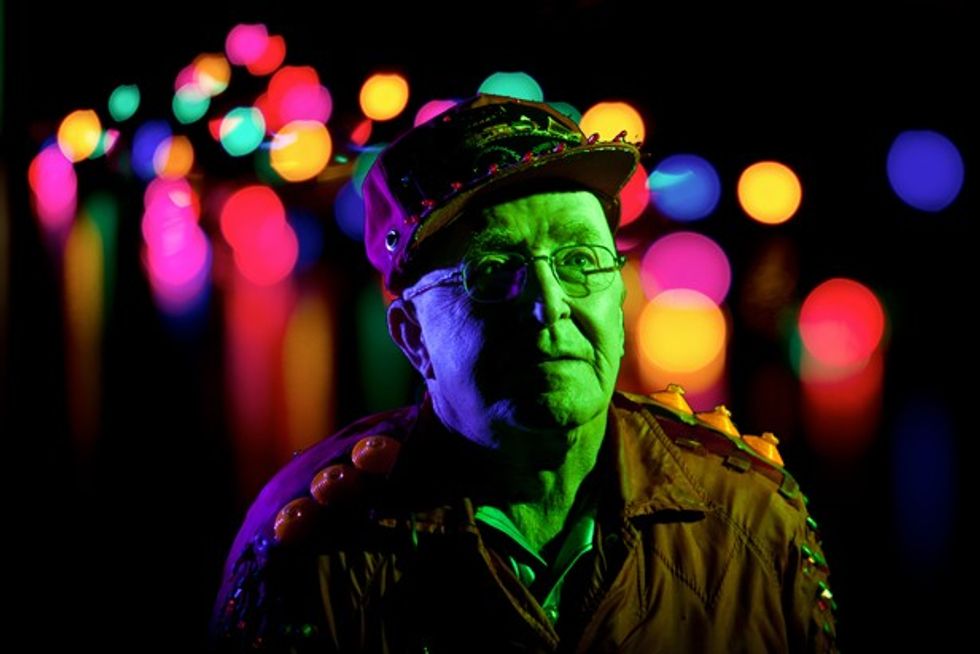

 'A Different Man'via A24
'A Different Man'via A24 'Bodies Bodies Bodies'via A24
'Bodies Bodies Bodies'via A24 'Past Lives'
via A24
'Past Lives'
via A24










